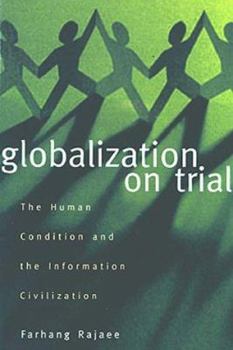Globalization on Trial: The Human Condition and the Information Civilization
This text challenges the conventional view that equates globalization with the expansion of the capitalist economic system. With a historical and holistic brush, the author presents a view of... This description may be from another edition of this product.
Format:Paperback
Language:English
ISBN:1565491114
ISBN13:9781565491113
Release Date:May 2000
Publisher:Kumarian Press
Length:149 Pages
Weight:0.70 lbs.
Dimensions:0.5" x 5.8" x 8.8"
Customer Reviews
1 rating
puting humanity on trial
Published by Thriftbooks.com User , 24 years ago
Professor Rajaee's Globalization On Trial is an erudite and eloquent petition for tempered rationality in addressing the issues fostered by the combination of forces which comprise "globalization". His stance puts him in stark contrast to those who see in these forces an ominous threat to a more acceptable status quo or as the inescapable advent of unparalleled economic growth and political liberalism. For Professor Rajaee, globalization represents a crossroads. That there are new, important forces at work in our world is undeniable. But where these forces my lead is, as yet, unpredictable. This is because, in Professor Rajee's opinion, this is because it is not really globalization that is on trial but humanity or, to be more precise, people in positions of leadership. This combination of forces may very easily divide communities and produce new hostilities and conflicts. They may lead to a world more sharply divided between rich and poor, for example. They may aggravate existing religious and cultural differences, and create new sources of animosity between people. Globalization is by no means is synonymous with peace, Professor Rajaee wisely observes. It is not an elixir but rather an opportunity. These forces inarguably bring communities closer. But the proximity refers only to physical closeness and the psychological closeness of interdependence. Whether this "closeness" leads to greater good or not will depend on the decisions made by communities and their leaders. Professor Rajaee's book is as much a plea for hope and faith as it is analysis and argument. Underlying his line of reasoning is an inspiring view of humanity which some might find too idealistic. But Professor Rajaee takes great pains to point out that bridging differences through reason is very much a part of our collective history. Similarly, he notes that solving collective problems equitably is also part of our history. His work is a splendid piece of philosophical optimism, which cuts through the thicket of trends, identifies the key elements shaping history, then summons us to exercise enlightened reason to resolve differences and take advantage of opportunities. We are on the verge of a more comfortable, more prosperous, more free, more fair world. Professor Rajaee asks us to recognize the fact, as well as recognize the very general steps we need to take to turn promise into fact.





